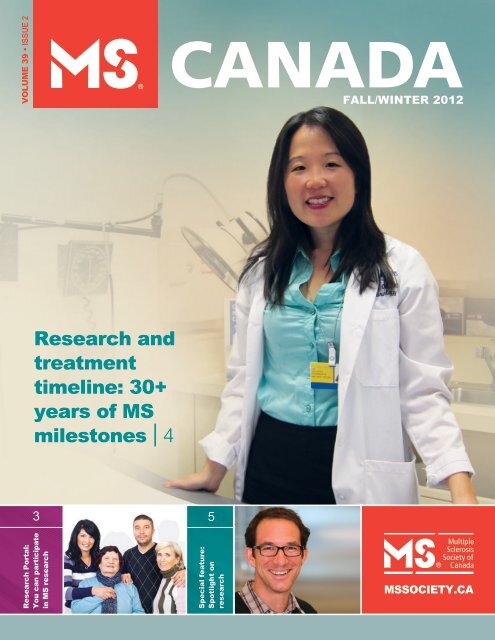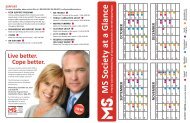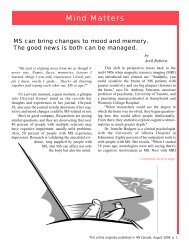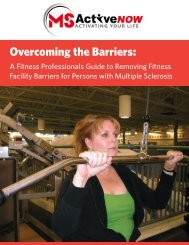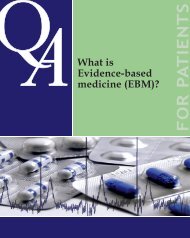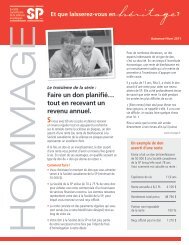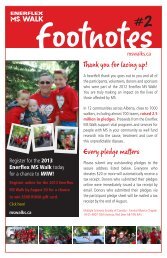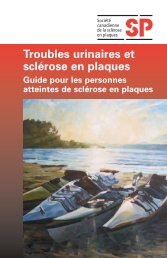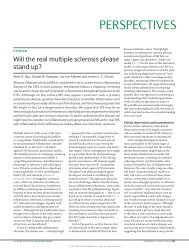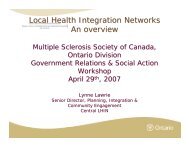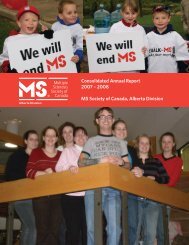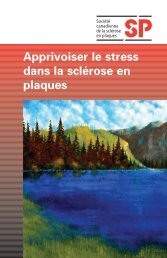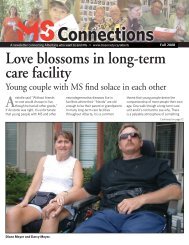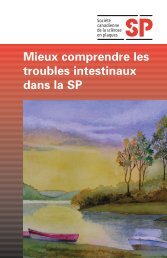Research and treatment timeline: 30+ years of ms milestones | 4
Research and treatment timeline: 30+ years of ms milestones | 4
Research and treatment timeline: 30+ years of ms milestones | 4
You also want an ePaper? Increase the reach of your titles
YUMPU automatically turns print PDFs into web optimized ePapers that Google loves.
Volume 39 • Issue 2<br />
<strong>Research</strong> <strong>and</strong><br />
<strong>treatment</strong><br />
<strong>timeline</strong>: <strong>30+</strong><br />
<strong>years</strong> <strong>of</strong> <strong>ms</strong><br />
<strong>milestones</strong> | 4<br />
3 5<br />
<strong>Research</strong> Portal:<br />
you can participate<br />
in <strong>ms</strong> research<br />
CANADA<br />
FAll/WINTeR 2012<br />
special feature:<br />
spotlight on<br />
research<br />
<strong>ms</strong>socIeTy.cA
<strong>ms</strong> canada Fall/Winter 2012 2<br />
am <strong>of</strong>ten reminded,<br />
I during conversations<br />
with people living with<br />
multiple sclerosis,<br />
that hope for an end<br />
Yves savoie<br />
to MS can mean<br />
very different things<br />
to different people. Whether it’s hope for a<br />
cure or hope for more effective symptom<br />
management, we are hopeful that advances<br />
in research will one day <strong>of</strong>fer a means to an<br />
end to MS. This issue <strong>of</strong> MS Canada focuses<br />
on research, past <strong>and</strong> present. Through<br />
increasing our knowledge about multiple<br />
sclerosis we are hopeful that a future free <strong>of</strong><br />
this disease can exist.<br />
We welcome the federal government’s<br />
announcement that the Phase I/II clinical trial<br />
for chronic cerebrospinal venous insufficiency<br />
(CCSVI) has received the necessary medical<br />
<strong>and</strong> ethical approvals required to proceed.<br />
The national MS interventional clinical trial<br />
is a collaborative initiative between the<br />
Government <strong>of</strong> Canada, provinces where there<br />
are trial sites <strong>and</strong> the MS Society. We are<br />
hopeful that the research <strong>of</strong> Dr. Traboulsee<br />
<strong>and</strong> his collaborators will provide significant<br />
insights to those living with MS <strong>and</strong> provide<br />
answers on questions about CCSVI <strong>and</strong> MS.<br />
My sincerest thanks to those who provided<br />
feedback on the Renewal Initiative, a 12-month<br />
process <strong>of</strong> engagement that sought ways for<br />
Ms Canada, Fall/Winter 2012<br />
Published by the Multiple Sclerosis Society <strong>of</strong> Canada<br />
175 Bloor St. E., Suite 700, Toronto ON M4W 3R8<br />
Tel: (416) 922-6065 • Fax: (416) 922-7538<br />
Toll free: 1-866-922-6065 • Website: <strong>ms</strong>society.ca/<strong>ms</strong>canada<br />
Charitable Registration no. 10774 6174 RR0001<br />
Our Mission: To be a leader in finding a cure for multiple sclerosis<br />
<strong>and</strong> enabling people affected by MS to enhance their quality <strong>of</strong> life.<br />
President <strong>and</strong> chief executive <strong>of</strong>ficer: Yves Savoie<br />
Editor-in-chief: Tiffany Regaudie<br />
Managing editor: Krysta Celestine<br />
ISSN 0315-1131<br />
Canadian Publications Mail Product<br />
Sales Agreement No. 40063383<br />
Message from yves<br />
the MS Society to be more effective <strong>and</strong><br />
efficient in delivering upon its mission. To those<br />
who provided input during this process, please<br />
know that you have played a significant role<br />
in helping to ensure that we will continue to<br />
best serve those affected by MS. For up to date<br />
information on the Renewal Initiative please<br />
visit <strong>ms</strong>society.ca/renewal<br />
I am also pleased to announce the<br />
appointment <strong>of</strong> Owen Charters to the<br />
position <strong>of</strong> chief development <strong>of</strong>ficer (CDO)<br />
effective January 14, 2013. Owen has played<br />
significant leadership roles spanning from<br />
hospital foundations to member-based,<br />
multi-level national organizations. Owen<br />
served CanadaHelps as president <strong>and</strong> chief<br />
executive <strong>of</strong>ficer since 2007 <strong>and</strong> is currently<br />
adjunct faculty at the Schulich School <strong>of</strong><br />
Business at York University. Owen will provide<br />
strategic vision <strong>and</strong> dynamic leadership as<br />
the architect <strong>of</strong> the MS Society’s development<br />
<strong>and</strong> marketing progra<strong>ms</strong>.<br />
A note <strong>of</strong> recognition <strong>and</strong> gratitude is also<br />
extended to Genzyme, a San<strong>of</strong>i Company,<br />
for their support <strong>of</strong> this edition <strong>of</strong> MS Canada<br />
through an unrestricted educational grant. I<br />
have heard from people living with MS that<br />
research brings them hope. I share in this<br />
sentiment <strong>and</strong> hope that the future will also<br />
bring answers <strong>and</strong> a cure. ■<br />
Yves Savoie<br />
Attention! We would like to keep in touch<br />
via email. If you would like to receive future<br />
issues <strong>of</strong> MS Canada electronically instead<br />
<strong>of</strong> a printed version, please send your full<br />
name, current address <strong>and</strong> email address to<br />
<strong>ms</strong>canada@<strong>ms</strong>society.ca<br />
ON THE COVER: Dr. Jiwon Oh, winner <strong>of</strong><br />
the Decker Family endMS <strong>Research</strong> <strong>and</strong> Training<br />
Network Transitional Career Development Award
Friendly Visiting Volunteer Program:<br />
Companionship for long-term care residents<br />
Clare, a former nurse with secondaryprogressive<br />
MS, has lived in long-term<br />
care for 12 <strong>years</strong>. While she is fortunate to<br />
have many friends <strong>and</strong> family who visit her,<br />
Clare is especially grateful for her friendship<br />
with Robin, her visitor from the MS Society’s<br />
Friendly Visiting Volunteer Program.<br />
“Robin <strong>and</strong> I are so much alike,” Clare says.<br />
“We hit it <strong>of</strong>f right away.” Robin, who was<br />
diagnosed with MS three <strong>years</strong> ago, visits her<br />
every Thursday. “We just sit <strong>and</strong> share things,”<br />
Clare says. “We go to the farmer’s market in<br />
the morning when it’s a little cooler <strong>and</strong> when<br />
we’re at a better energy level.”<br />
A study led by Dr. Sharon Warren <strong>of</strong> the<br />
University <strong>of</strong> Alberta 1 found that people with<br />
MS who live in long-term care are <strong>of</strong>ten<br />
isolated, lonely <strong>and</strong> at risk <strong>of</strong> depression. In<br />
2008, the MS Society, Alberta <strong>and</strong> Northwest<br />
Territories Division successfully advocated for<br />
provincial government funding for the Friendly<br />
Visiting Volunteer Program, which matches<br />
Anne was diagnosed with multiple sclerosis<br />
in April 2012, but she <strong>and</strong> her doctor<br />
believe she has had the disease for more<br />
than 20 <strong>years</strong>. “I’ve experienced a lot <strong>of</strong><br />
small, mysterious sympto<strong>ms</strong> throughout my<br />
life,” Anne says. “When I was finally able to<br />
put a name to the disease, I tried to find out<br />
everything I could about it.”<br />
When Anne accessed the MS Society website,<br />
she discovered the new MS <strong>Research</strong> Portal;<br />
as a former nurse, Anne sees the value <strong>of</strong><br />
participating in medical research. To start,<br />
Anne took part in Dr. Michelle Ploughman’s<br />
extensive “Canadian Survey <strong>of</strong> Health<br />
Lifestyle <strong>and</strong> Aging with MS,” which gathers<br />
information on mental health, physical health,<br />
volunteers with people with MS who would<br />
benefit from companionship.<br />
The program currently operates in Edmonton<br />
<strong>and</strong> Calgary, where over 100 residents receive<br />
visits from volunteers <strong>and</strong> staff who run the<br />
program. The MS Society is working closely<br />
with the Alberta government to exp<strong>and</strong> the<br />
program to rural Alberta.<br />
Clare feels that Robin has become much more<br />
than a visitor. The two share a very warm<br />
friendship, <strong>and</strong> every week that they are<br />
together, they provide each other with moral<br />
support. The visits also give her a sense <strong>of</strong><br />
satisfaction. “I’m not nursing physically, but<br />
I’m nursing on a psychological <strong>and</strong> spiritual<br />
level,” Clare says.<br />
For more information, visit <strong>ms</strong>society.ca/<br />
friendlyvisiting ■<br />
1 Warren, S. et al. A pr<strong>of</strong>ile <strong>of</strong> multiple sclerosis patients in long term<br />
care centres using the Continuing Care Needs Determination Instrument<br />
(CCNDI). Presented at the Consortium <strong>of</strong> Multiple Sclerosis Centres<br />
Conference, Halifax, Nova Scotia, 2000.<br />
MS <strong>Research</strong> Portal: you can participate in <strong>ms</strong> research<br />
diet, exercise, smoking, stress <strong>and</strong> other<br />
aspects <strong>of</strong> health in relation to the trajectory<br />
<strong>of</strong> MS in one’s life.<br />
The MS <strong>Research</strong> Portal website features<br />
research studies in Canada that are<br />
currently seeking participants. All studies<br />
are supported by the MS Society or other<br />
recognized funding agencies that have formal<br />
peer review processes.<br />
“Participating in research isn’t just for me,”<br />
Anne says. “The information I provide is going<br />
to help someone else with MS looking to<br />
educate the<strong>ms</strong>elves on the disease.”<br />
To access the MS <strong>Research</strong> Portal, visit<br />
<strong>ms</strong>research.ca ■<br />
<strong>ms</strong> canada Fall/Winter 2012 3
<strong>ms</strong> canada Fall/Winter 2012 4<br />
<strong>Research</strong> <strong>and</strong> <strong>treatment</strong> <strong>timeline</strong>: <strong>30+</strong> <strong>years</strong> <strong>of</strong> MS <strong>milestones</strong><br />
While there is still a long way to go in underst<strong>and</strong>ing multiple sclerosis <strong>and</strong> finding a cure, we<br />
are pleased to look back on the important advancements that have been made to broaden our<br />
underst<strong>and</strong>ing <strong>of</strong> this complex disease <strong>and</strong> improve quality <strong>of</strong> life.<br />
For complete information on MS Society funded research, visit <strong>ms</strong>society.ca/researchsummaries<br />
For a more detailed version <strong>of</strong> the MS research <strong>timeline</strong>, please visit <strong>ms</strong>society.ca/research<strong>timeline</strong><br />
Magnetic resonance imaging (MRI) first<br />
used to examine a person with MS<br />
Canadian researchers find gene<br />
linkage to MS susceptibility<br />
Rebif ® <strong>and</strong> Avonex ® (interferon<br />
beta-1a) approved in Canada for<br />
relapsing-remitting MS to reduce the<br />
number <strong>of</strong> attacks, slow the progression<br />
<strong>of</strong> physical disability <strong>and</strong> to reduce the<br />
number <strong>of</strong> brain lesions seen on MRI<br />
MSSRF funds study <strong>of</strong> $4 million over<br />
six <strong>years</strong> that ai<strong>ms</strong> to determine whether<br />
transplanting bone marrow stem cells in<br />
people with MS can stop the disease<br />
Link between vitamin D <strong>and</strong> the reduced<br />
risk <strong>of</strong> MS identified<br />
Dr. Paolo Zamboni identifies a<br />
possible association between chronic<br />
cerebrospinal venous insufficiency<br />
(CCSVI) <strong>and</strong> MS<br />
MS Society <strong>and</strong> the National MS Society<br />
(USA) commit over $2.4 million to support<br />
seven new research projects focusing on<br />
CCSVI <strong>and</strong> its relationship to MS<br />
MSSRF funds a $3.8 million study on<br />
progressive for<strong>ms</strong> <strong>of</strong> MS<br />
1981<br />
1996<br />
1998<br />
2000<br />
2004<br />
2008<br />
2010<br />
2011<br />
1995<br />
1997<br />
1999<br />
2004<br />
2006<br />
2009<br />
2011<br />
2011<br />
Betaseron ® (interferon beta-1b) approved<br />
by Health Canada for <strong>treatment</strong> <strong>of</strong> people<br />
with relapsing-remitting MS<br />
Copaxone ® (glatiramer acetate) approved<br />
in Canada for people with RRMS who are<br />
able to walk to reduce frequency <strong>of</strong> attacks<br />
Multiple Sclerosis Scientific <strong>Research</strong><br />
Foundation (MSSRF) funds Canadian<br />
Collaborative Project on Genetic<br />
Susceptibility in MS, in the amount <strong>of</strong><br />
$4.7 million over three <strong>years</strong><br />
Betaseron ® (interferon beta-1b) approved<br />
by Health Canada as a <strong>treatment</strong> for<br />
secondary-progressive MS, to slow the<br />
progression <strong>of</strong> disability <strong>and</strong> to reduce the<br />
frequency <strong>of</strong> MS attacks<br />
MSSRF funds a five-year, $4.3 million<br />
study on children who experience an initial<br />
attack <strong>of</strong> MS <strong>and</strong> who go on to experience<br />
a second, in hope <strong>of</strong> identifying key triggers<br />
which cause MS<br />
Tysabri ® (natalizumab) approved for<br />
<strong>treatment</strong> <strong>of</strong> RRMS to reduce the frequency<br />
<strong>of</strong> relapses, delay the progression <strong>of</strong><br />
disability <strong>and</strong> reduce the number <strong>and</strong><br />
volume <strong>of</strong> brain lesions seen on MRI<br />
Extavia ® (interferon beta-1b) approved in<br />
Canada for reduction <strong>of</strong> relapses in RRMS<br />
<strong>and</strong> slowing <strong>of</strong> disability in secondaryprogressive<br />
MS<br />
Gilenya ® (fingolimod), first oral diseasemodifying<br />
therapy for MS, approved in Canada<br />
MS Society funded study at the University<br />
<strong>of</strong> Alberta discovers new MRI method that<br />
measures iron levels in brain tissue to track<br />
disease progression
special feature: Spotlight on research<br />
Whether discovering new ways to treat sympto<strong>ms</strong> or trying to find a cure, researchers<br />
are working hard to make advances that will benefit the lives <strong>of</strong> people with MS. Through<br />
research in the areas <strong>of</strong> myelin repair, symptom management, environment as a possible<br />
cause <strong>and</strong> the development <strong>of</strong> <strong>treatment</strong>s for MS, the research <strong>of</strong> today looks to form a<br />
path to a brighter future for those who live with MS.<br />
In this special feature, we are pleased to highlight some <strong>of</strong> the important research<br />
happening right now in the MS community.<br />
myelin repair<br />
Myelin is<br />
the fatty<br />
coating that<br />
protects <strong>and</strong><br />
surrounds nerve<br />
fibres within the<br />
central nervous<br />
system. Often<br />
compared to the<br />
insulating material around electrical<br />
wiring, myelin aids the conduction <strong>of</strong><br />
electrical signals between neurons<br />
within the spinal cord <strong>and</strong> brain.<br />
Multiple sclerosis involves the body’s<br />
immune system attacking <strong>and</strong><br />
destroying myelin. Such demyelination<br />
can cause interference in transmitting<br />
nerve signals, which can cause blurred<br />
vision, slurred speech, trembling <strong>and</strong><br />
cognitive difficulties.<br />
Some approved therapies for MS<br />
involve slowing down the body’s<br />
immune system to prevent it<br />
from attacking the myelin. Such<br />
<strong>treatment</strong> can prevent the disease<br />
from progressing <strong>and</strong> can minimize<br />
attacks. <strong>Research</strong> is currently<br />
ongoing with regard to developing<br />
techniques to induce myelin repair<br />
with antibodies; however, studies<br />
are still exploring if this method can<br />
be effective in restoring the loss <strong>of</strong><br />
myelin in humans.<br />
What’s happening now<br />
Michael Keough<br />
university <strong>of</strong> Calgary<br />
PhD studentship<br />
Michael Keough is the recipient<br />
<strong>of</strong> a 2012 MS Society <strong>of</strong><br />
Canada Doctoral Award for his<br />
project, “Altering the Inhibitory<br />
Microenvironment to Promote<br />
Oligodendrocyte Maturation <strong>and</strong> Remyelination.”<br />
Remyelination is characteristic in acute multiple<br />
sclerosis (MS) lesions yet <strong>of</strong>ten fails in chronic<br />
stages <strong>of</strong> disease. Oligodendrocyte precursor cells<br />
(OPCs) reside in chronic MS lesions in immature<br />
states, suggesting that inhibitory molecules in the<br />
lesion environment cause remyelination failure.<br />
Extracellular matrix molecules called “chondroitin<br />
sulfate proteoglycans” are abnormally elevated in<br />
chronic MS lesions, <strong>and</strong> data indicates that they are<br />
responsible for remyelination failure.<br />
Mr. Keough’s goal is to further analyze these<br />
molecules <strong>and</strong> seek therapeutics to overcome<br />
their inhibition <strong>of</strong> OPCs, such that remyelination<br />
can be possible in chronic stages <strong>of</strong> MS.<br />
“There are currently no MS medications targeted to<br />
directly impact regeneration <strong>of</strong> lost myelin,” Keough<br />
says. “A new angle <strong>of</strong> <strong>treatment</strong>, in combination with<br />
current <strong>and</strong> advancing immunomodulatory therapies,<br />
may be beneficial to people living with MS.”<br />
<strong>ms</strong> canada Fall/Winter 2012 5
<strong>ms</strong> canada Fall/Winter 2012 6<br />
symptom management<br />
Sympto<strong>ms</strong> <strong>of</strong> MS include pain, fatigue, bladder dysfunction, vision proble<strong>ms</strong>, difficulty<br />
walking, cognitive change <strong>and</strong> dizziness.<br />
Managing sympto<strong>ms</strong> in MS is essential throughout the course <strong>of</strong> the disease. It is important<br />
for those who live with MS to underst<strong>and</strong> their sympto<strong>ms</strong> <strong>and</strong> seek available methods to<br />
improve quality <strong>of</strong> life. Proper symptom management involves underst<strong>and</strong>ing how MS can be<br />
treated, seeking proper care from health pr<strong>of</strong>essionals <strong>and</strong> maintaining a healthy lifestyle.<br />
What’s happening now<br />
Dr. Neil Rector<br />
sunnybrook<br />
<strong>Research</strong> Institute<br />
Dr. Neil Rector is the<br />
recipient <strong>of</strong> a 2012 MS<br />
Society Operating Grant for<br />
his project, “A R<strong>and</strong>omized<br />
Controlled Trial Testing the Additive<br />
Benefits <strong>of</strong> Cognitive Behaviour Therapy<br />
(CBT) <strong>and</strong> Exercise for Depression <strong>and</strong><br />
Cognitive Dysfunction in MS.”<br />
Dr. Rector’s goals are to investigate the<br />
effects <strong>of</strong> CBT, exercise <strong>and</strong> a combination<br />
<strong>of</strong> the two on episodes <strong>of</strong> depression <strong>and</strong><br />
neuropsychological functioning.<br />
“The results <strong>of</strong> this clinical study will<br />
provide an important contribution to<br />
knowledge about the <strong>treatment</strong> <strong>and</strong><br />
associated neurocognitive aspects <strong>of</strong><br />
depression in MS,” Dr. Rector says.<br />
“This study will be the first to determine<br />
whether evidence-based, non-medical<br />
<strong>treatment</strong>s for mood disorders in MS<br />
reduce underlying cognitive substrates<br />
associated with the illness <strong>and</strong> known to<br />
be exacerbated by depression.”<br />
“<br />
The results <strong>of</strong><br />
this clinical<br />
study will<br />
provide an<br />
important<br />
contribution to<br />
knowledge about<br />
the <strong>treatment</strong><br />
<strong>and</strong> associated<br />
neurocognitive<br />
aspects <strong>of</strong><br />
depression<br />
in MS.<br />
”
environment as a possible cause <strong>of</strong> MS<br />
Multiple sclerosis is more common in people who live farther from the equator (although<br />
many exceptions exist). Decreased sunlight exposure has been linked to a higher risk <strong>of</strong> MS.<br />
Decreased vitamin D production <strong>and</strong> intake is the main biological mechanism used to explain<br />
the higher risk <strong>of</strong> MS among those less exposed to sun.<br />
A three-year study coordinated by the World Health Organization (WHO) <strong>and</strong> the Multiple Sclerosis<br />
International Federation (MSIF) highlights prevalence <strong>of</strong> MS across the world. Canada has been<br />
identified as being one <strong>of</strong> the countries with the highest prevalence <strong>of</strong> MS in the world.<br />
What’s happening now<br />
Dr. Afsaneh shirani<br />
university <strong>of</strong><br />
British Columbia<br />
Afsaneh Shirani is a recipient<br />
<strong>of</strong> a 2012 MS Society<br />
Postdoctoral Fellowship.<br />
Dr. Shirani’s project<br />
entitled, “Temporal Changes in Disability<br />
Progression <strong>and</strong> Demographics in Multiple<br />
Sclerosis” will investigate if disability<br />
progression has changed over time in<br />
patients with MS in British Columbia. It will<br />
also examine whether there have been<br />
changes in sex ratio (i.e. the number <strong>of</strong><br />
men <strong>and</strong> women with MS), onset age <strong>and</strong><br />
disease course over time in patients with<br />
MS living in British Columbia, Nova Scotia<br />
<strong>and</strong> Manitoba.<br />
“The results <strong>of</strong> this project would contribute<br />
to a better underst<strong>and</strong>ing <strong>of</strong> the natural<br />
course <strong>of</strong> MS <strong>and</strong> may have important<br />
implications for the role <strong>of</strong> environmental<br />
factors in MS,” Shirani says. “This project<br />
will also provide insights for better social,<br />
economic <strong>and</strong> healthcare planning for<br />
those with MS.”<br />
“<br />
The results <strong>of</strong><br />
this project<br />
will contribute<br />
to a better<br />
underst<strong>and</strong>ing<br />
<strong>of</strong> the natural<br />
course <strong>of</strong> MS<br />
<strong>and</strong> may have<br />
important<br />
implications<br />
for the role <strong>of</strong><br />
environmental<br />
factors in MS.<br />
”<br />
<strong>ms</strong> canada Fall/Winter 2012 7
<strong>ms</strong> canada Fall/Winter 2012 8<br />
MS <strong>treatment</strong>s<br />
Thanks to research within Canada <strong>and</strong> around the world, new <strong>treatment</strong>s for multiple<br />
sclerosis are steadily emerging. Medications may decrease the severity <strong>of</strong> MS relapses caused<br />
by increased inflammation in the central nervous system, but they may also treat sympto<strong>ms</strong><br />
such as fatigue, pain <strong>and</strong> muscle tightness. These <strong>treatment</strong>s look to improve the quality <strong>of</strong><br />
life for people with MS.<br />
What’s happening now<br />
Dr. Bradley Kerr<br />
university <strong>of</strong> Alberta<br />
Dr. Bradley Kerr was awarded<br />
a 2012 Donald Paty Career<br />
Development Award for his<br />
project, “Examining the Underlying<br />
Mechanis<strong>ms</strong> <strong>of</strong> Neuropathic Pain in<br />
Multiple Sclerosis.”<br />
Chronic pain greatly impacts the quality <strong>of</strong> life for<br />
people living with MS. Neuropathic pain occurs<br />
when damage takes place within the nervous<br />
system. Currently, there are not many effective<br />
<strong>treatment</strong>s to relieve this type <strong>of</strong> pain, as little is<br />
known about what causes it.<br />
Dr. Kerr ai<strong>ms</strong> to test whether the function <strong>of</strong><br />
glutamate transporters proteins that control pain<br />
signals in the nervous system are impaired,<br />
leading to neuropathic pain. He will go on to test<br />
if a particular drug that is used to restore the<br />
function <strong>of</strong> glutamate transporter can prevent<br />
neuropathic pain. He will further investigate how<br />
a clinical <strong>treatment</strong> that reduces inflammation<br />
can affect neuropathic pain, <strong>and</strong> if it will have any<br />
effect on glutamate transporters.<br />
“My research program ai<strong>ms</strong> to identify the causes<br />
<strong>of</strong> pain in MS,” says Dr. Kerr. “This will help<br />
generate new therapies to improve the quality <strong>of</strong><br />
life for MS patients.”<br />
“<br />
My research<br />
program ai<strong>ms</strong><br />
to identify the<br />
causes <strong>of</strong><br />
pain in MS.<br />
This will help<br />
generate new<br />
therapies to<br />
improve the<br />
quality <strong>of</strong><br />
life for MS<br />
patients.<br />
”
canadian Physical Activity Guidelines for Adults with <strong>ms</strong><br />
he Canadian Society for Exercise<br />
T Physiology (CSEP) has released Canadian<br />
Physical Activity Guidelines for Adults with MS.<br />
The MS Society recommends these guidelines<br />
for those living with MS who want to pursue<br />
physical activity. These are the first set <strong>of</strong><br />
physical activity guidelines for adults with<br />
MS developed through a rigorous, multi-step<br />
process that meets international st<strong>and</strong>ards for<br />
guideline development.<br />
Following these guidelines can improve<br />
aerobic endurance <strong>and</strong> muscle strength<br />
among adults with minimal to moderate FOR<br />
SUMMARY OF THE<br />
disability resulting from either relapsingremitting<br />
or progressive for<strong>ms</strong> <strong>of</strong> MS. Meeting<br />
these guidelines may also reduce fatigue,<br />
improve mobility <strong>and</strong> enhance elements <strong>of</strong><br />
health-related quality <strong>of</strong> life.<br />
Currently, there is no scientific evidence<br />
that following these guidelines will result in<br />
relapse <strong>of</strong> MS sympto<strong>ms</strong> or worsen fatigue<br />
or health related quality <strong>of</strong> life. A summary<br />
<strong>of</strong> the guidelines is provided below.<br />
To view the full guidelines <strong>and</strong> for more<br />
2012 SCIENTIFIC STATEMENTS<br />
information, visit csep.ca/guidelines or<br />
<strong>ms</strong>society.ca/physicalguidelines ■<br />
Canadian Physical Activity Guidelines<br />
FOR ADULTS WITH MULTIPLE SCLEROSIS<br />
24<br />
24<br />
24<br />
Guidelines<br />
To achieve important fitness benefits, adults aged 18-65 <strong>years</strong> with multiple<br />
sclerosis who sum have audaeseque mild to nonsequ moderate aspidit et disability que natae cuptatqui need rent at doluptum least: voloribus rerersp elictum ut<br />
et l<strong>and</strong>em qui cusapic ipient audaerestint exerecae labo. On cum voluptatus <strong>and</strong>i doloria spienda nam<br />
• 30 minutes eos <strong>of</strong> mos moderate doloriam fugias intensity debit, occullenim aerobic autas plis activity, etur aut plabores 2 times et omnime per week, occulparci utatest<br />
AND<br />
accaboresti culluptiisci re, sequiatur? Ximin num id que voleces dolupta estrumet aruntisciam reratur as<br />
• Strength training exercises for major muscle group, 2 times per week.<br />
Meeting these guidelines may also reduce fatigue, improve mobility <strong>and</strong> enhance<br />
elements <strong>of</strong> health related to quality <strong>of</strong> life.<br />
Let’s talk intensity!<br />
Canadian Physical Activity Guidelines<br />
Preamble<br />
Aximus inveriore, qui acium sunt.<br />
Is etus eius es apisqua temquam as rem eatqui consenisin prate exceperum audae dolla nihillupist,<br />
tempeliquo earcide rferchic tem aria cus dolorita qui te voluptati autatus daniasperum qui rehendu<br />
cipsaessed ut et volupta tiosam voles quostem corio inciliquodis modiscieniet quide dolo omnis asperem<br />
faceper spitisit, quiat.<br />
Magnis ipsaectes autem inim intius ducipsaped mo id ut quod es et essint.<br />
Officidelit hilitasim quunt omnim vidit, aboreium verum sequame nis dolore, con el is eum ne lam sintio<br />
evenihici sincto maionsed quiatemque aut et eosaper chillaut dempori busdae. Nem. Es enis siti<strong>and</strong>am<br />
abor sunt est, a natibusam con cus sam, non con et <strong>of</strong>fic tem rent accum volent res aliqui dolectemqui sit<br />
et volores accus eos molorae volupta sperorent expedisse nihitat uritat lacil ea dolorestem que natempe<br />
rnatem faciatur molorio reprectori non prae vollictor aborepe rorionsento doluptas ut reium et volupta<br />
quuntur?<br />
Dellupt atiam, optatur arum ide natusaes quodis aut mos enda doluptia vit, sam illaborem harcili tatibus<br />
ipsam quam aut et harcipsam elestis estiure cumqui <strong>of</strong>ficim pernatur, sit, acerumq uaeremporum venditis<br />
seque nem fuga. Nam rerovitaque nam quae quas ellauta voluptat voluptatia siminctecus volum volende<br />
licienest, el id quo et qui odi con erferios sam eturepe digendel ium resed minventuria doluptatur min ent<br />
vitateces moluptatibus autemqui ommo test experfe ristrum nostiuntiore pori<strong>and</strong>it quatis dis as ime nobis<br />
sus as rem fuga. Mus sitiorro essinti dit, ilit pl<strong>and</strong>e nonsequodio te volupta ssequo mod mostion sedipita<br />
Guidelines<br />
• Moderate-intensity physical activity<br />
is usually a 5 or 6 on a scale <strong>of</strong> 10<br />
<strong>and</strong> causes your heart rate to go up<br />
• Pick a resistance (free weights, cable<br />
pulleys, b<strong>and</strong>s, etc.) heavy enough<br />
that you can barely, but safely, finish<br />
10-15 repetitions <strong>of</strong> the last set<br />
• Repetitions are the number <strong>of</strong> times<br />
you lift <strong>and</strong> lower a weight<br />
Important things to know<br />
• Rum quae vendi dolorep erferuptate eturem que am, tore volendae nulpa<br />
volori sus at ent ullupti quamus, velitis earit expelecus.<br />
• Aerobic <strong>and</strong> strength training<br />
activities can be done on the<br />
same day<br />
• Rest your muscles for at least one<br />
day between strength training<br />
sessions<br />
o Hicitate molore dio cuptatibea consequi doluptate iust, issi im<br />
o Hicitate molore dio cuptatibea consequi doluptate iust, issi im.<br />
• Hicitate molore dio cuptatibea consequi doluptate iust, issi im<br />
© Canadian Society for Exercise Physiology, 2012. All rights reserved.<br />
For more information<br />
please go to …<br />
www.csep.ca/guidelines<br />
<strong>ms</strong> canada Fall/Winter 2012 9
<strong>ms</strong> canada Fall/Winter 2012 10<br />
<strong>Research</strong> is hope: The Decker family<br />
Bob <strong>and</strong> Pat Decker with Dr. Jiwon Oh<br />
Dr. Jiwon oh,<br />
winner <strong>of</strong> the Decker<br />
Family endMS<br />
<strong>Research</strong> <strong>and</strong><br />
Training Network<br />
Transitional Career<br />
Development Award<br />
When Bob Decker’s wife, Pat, was<br />
diagnosed with relapsing-remitting<br />
multiple sclerosis in 1989, he took action<br />
by raising almost $10,000 for his local MS<br />
Walk. Over 20 <strong>years</strong> later, Bob remains an<br />
active member <strong>of</strong> the MS Society – <strong>and</strong> his<br />
generous gift <strong>of</strong> $500,000 to the endMS<br />
campaign will fund the Decker Family endMS<br />
<strong>Research</strong> <strong>and</strong> Training Network Transitional<br />
Career Development Award for a young<br />
postdoctoral fellow.<br />
For Bob <strong>and</strong> his family, research means hope<br />
for a cure. Bob feels donations to research<br />
will have long-term benefits for people living<br />
with MS. “While it may be frustrating not to<br />
see an immediate impact, I think research<br />
fosters hope,” Bob says. “<strong>Research</strong>ers<br />
pursue avenues without knowing a definitive<br />
outcome, but there is outst<strong>and</strong>ing value in<br />
their potential <strong>and</strong> the hope they provide.” ■<br />
Dr. Jiwon Oh <strong>of</strong> Johns Hopkins University is<br />
the recipient <strong>of</strong> the Decker Family endMS<br />
<strong>Research</strong> <strong>and</strong> Training Network Transitional<br />
Career Development Award. Her research uses<br />
advanced MRI techniques to determine how<br />
spinal cord lesions, a common problem in MS,<br />
cause sensorimotor deficits.<br />
“This support is invaluable to young investigators<br />
like me,” says Dr. Oh. “It provides us with<br />
material <strong>and</strong> educational support to pursue<br />
academic goals that will make a contribution to<br />
the field <strong>of</strong> multiple sclerosis.”<br />
The award is supported by a gift <strong>of</strong> $500,000<br />
from the Decker family to the endMS<br />
campaign. ■
Lacey Andreas inspires the movement to end <strong>ms</strong><br />
Lacey<br />
Andreas, A&W<br />
Cruisin’ for a<br />
Cause<br />
inspirational<br />
champion<br />
Lacey Andreas, inspirational champion<br />
for the 2012 A&W Cruisin’ for a Cause<br />
campaign, underst<strong>and</strong>s the unpredictability<br />
<strong>of</strong> multiple sclerosis. “I’ve learned to listen<br />
to my body,” says Lacey, who, as a personal<br />
trainer, uses diet <strong>and</strong> exercise to help manage<br />
her sympto<strong>ms</strong>. Now more than ever, Lacey is<br />
hopeful for a future free <strong>of</strong> MS <strong>and</strong> is passionate<br />
about research that will help improve quality <strong>of</strong><br />
life for people living with the disease.<br />
listening to People Affected<br />
by <strong>ms</strong>: We want to hear from you<br />
The MS Society has launched the<br />
Listening to People Affected by<br />
MS initiative, which ai<strong>ms</strong> to hear from<br />
Canadians affected by MS about their<br />
quality <strong>of</strong> life priorities, needs <strong>and</strong><br />
barriers.<br />
The MS Society <strong>of</strong> Canada’s mission is<br />
to be a leader in finding a cure for MS<br />
<strong>and</strong> enabling those affected by MS to<br />
enhance their quality <strong>of</strong> life. We want<br />
to hear directly from you about the<br />
realities <strong>of</strong> your day-to-day life. What<br />
are your priorities when it comes to<br />
living well with MS? Are there barriers<br />
that prevent you from living a full life?<br />
What supports are most helpful? What<br />
are your biggest worries?<br />
On August 23, more than 750 A&W<br />
restaurants across Canada opened their doors<br />
for the fourth annual Cruisin’ for a Cause<br />
Day. Over the summer, the campaign raised a<br />
record total <strong>of</strong> $1.25 million for research <strong>and</strong><br />
services for people living with MS. Every year<br />
A&W franchisees look forward to engaging<br />
with their community on Cruisin’ for a Cause<br />
Day, when one dollar for every Teen Burger ®<br />
goes to the MS Society.<br />
“Big events like Cruisin’ for a Cause fund<br />
research that will have a real impact on<br />
the lives <strong>of</strong> people with MS down the line,”<br />
Lacey says. “People with MS need this kind<br />
<strong>of</strong> support so they can eventually see a real<br />
difference in their everyday lives.”<br />
You can still donate to the A&W<br />
Cruisin’ for a Cause campaign. Visit<br />
cruisinforacause2012.ca to find out how. ■<br />
Have your voice heard through an anonymous,<br />
nationwide survey, <strong>and</strong> help inform the progra<strong>ms</strong>,<br />
services <strong>and</strong> advocacy decisions that we make as<br />
an organization.<br />
We want to hear from:<br />
• those living with a diagnosis <strong>of</strong> MS;<br />
• those waiting for a diagnosis with respect<br />
to MS;<br />
• close friends or family members <strong>of</strong><br />
people with MS;<br />
• caregivers <strong>of</strong> people with MS.<br />
Visit <strong>ms</strong>listening.ca to take the survey online.<br />
To request a paper copy <strong>of</strong> the survey, call<br />
1-800-268-7582. If you request a paper copy,<br />
you will have the option <strong>of</strong> sharing your responses<br />
verbally through a dedicated toll-free number. ■<br />
<strong>ms</strong> canada Fall/Winter 2012 11
stay in the know. For the<br />
most current information<br />
on ccsVI, visit ccsvi.ca<br />
2012 ecTRI<strong>ms</strong> congress:<br />
Access live coverage<br />
The MS Society <strong>of</strong> Canada has partnered<br />
with the National MS Society in the United<br />
States to connect the MS community<br />
with researchers who attended the 2012<br />
European Committee for <strong>Research</strong> <strong>and</strong><br />
Treatment in Multiple Sclerosis Congress.<br />
Access videos <strong>and</strong> highlights from the<br />
conference, which took place in Lyon, France<br />
in October.<br />
Visit blog.national<strong>ms</strong>society.org for English<br />
coverage or sP-ectri<strong>ms</strong>.blogspot.com for<br />
French coverage.<br />
CANADA<br />
Share your comments:<br />
<strong>ms</strong>canada@<strong>ms</strong>society.ca<br />
Fall 2007<br />
Update your mailing address or subscription<br />
preferences by contacting your division <strong>of</strong>fice.<br />
Division contact information can be found at<br />
<strong>ms</strong>society.ca or call 1-800-268-7582 or email<br />
info@<strong>ms</strong>society.ca. To view this publication<br />
online, visit <strong>ms</strong>society.ca/<strong>ms</strong>canada<br />
FPo<br />
“I’m getting benefit from research now, <strong>and</strong><br />
hopefully our estate can help people down the road.”<br />
~ Marion & Martin, British Columbia<br />
RETURN UNDELIVERABLE<br />
CANADIAN ADDRESSES TO:<br />
Multiple Sclerosis Society <strong>of</strong> Canada<br />
700 – 175 Bloor St. E.<br />
Toronto, ON M4W 3R8<br />
What do you want your<br />
legacy to be?<br />
1-800-268-7582<br />
MSlegacy@<strong>ms</strong>society.ca<br />
MSlegacy.ca<br />
Publications<br />
Mail Agreement<br />
# 40063383


